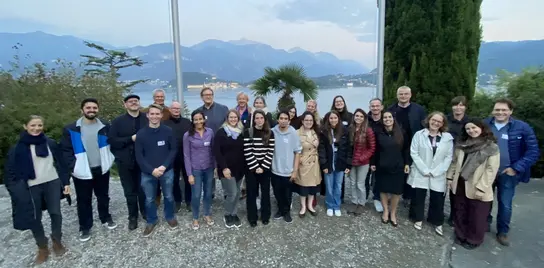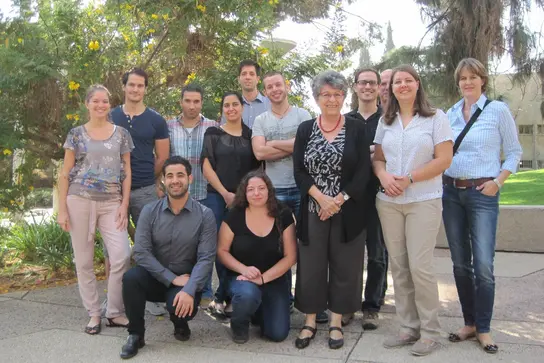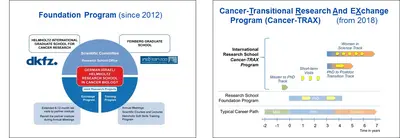German-Israeli Helmholtz International Research School in Cancer Biology

Based on a long tradition of scientific interaction between the German Cancer Research Center (DKFZ) in Heidelberg/Germany and the Weizmann Institute of Science (WIS) in Rehovot/Israel, the German-Israeli Helmholtz International Research School in Cancer Biology has been established. This Research School is a joint PhD study program of the DKFZ International PhD Program and the Feinberg Graduate School of the WIS.
Within the German-Israeli Helmholtz Research School in Cancer Biology, the Foundation Program (launched in 2012) offers a fulltime PhD program including long-term research stays at the partner institution.
The newly established Cancer-TRAX Program (from 2018) complements the Foundation Program by bridging the career stages into and following the PhD. It provides several funding tracks for PhD and MSc students at the DKFZ and the WIS to establish collaborative projects throughout the course of their scientific career.
Cancer-TRAX Program
The Cancer Transitional Research And EXchange Program (Cancer-TRAX) within the German-Israeli Helmholtz International Research School is a new interdisciplinary advanced training program in cancer research to support the scientific career development of early stage researchers.
Continuing the collaboration between the German Cancer Research Center (DKFZ) and the Weizmann Institute of Science (WIS), the Cancer-TRAX program offers its fellows a unique opportunity to receive interdisciplinary, top-level scientific training in an international setting, preparing them for an internationally-competitive scientific career.
The Cancer-TRAX program features four funding tracks for PhD and MSc students to develop collaborative projects with the Weizmann Institute of Science.
The Cancer-TRAX Program offers travel grants for DKFZ/WIS master students for a 3-month research stay at the partner institute.
The Cancer-TRAX Program provides funding for up to 2-years, following the end of the third year of their PhD, to students who wish to establish a longer-term collaboration with the partner laboratory. The funding period will act as a bridging postdoc position, offering the participants a unique career development opportunity.
One of the goals of the Cancer-TRAX Program is to encourage particularly talented female PhD students to pursue an academic career through a dedicated “Women in Science” program. The Women in Science Track promotes international mobility of talented young female scientists through a flexible collaboration model, which complements the gender equality polices and measures to promote compatibility of work and family life at both institutes.
The Cancer-TRAX Program provides short-term travel grants to DKFZ/WIS PhD students who wish to address a particular aspect of their thesis project through a short research visit of up to 3 months to a laboratory at the partner institute.
The exact application process depends upon on your prospective home institute.
German Cancer Research Center (DKFZ)
Application is open for DKFZ PhD and Master students:
- Short-Term-Visit Tracks for MSc and PhD students to allow them to spend 1-3 months working at the Weizmann Institute > Application at any time
- PhD-to-Postdoc Track for senior PhD students > new call will be announced
- Women-in-Science Track for female senior PhD students > new call will be announced
More information is available here (only accessible within the DKFZ network).
Weizmann Institute of Science (WIS)
Please contact Prof. Valery Krizhanovsky for more information.
Foundation Program
The DKFZ in Heidelberg and the Weizmann Institute of Science in Rehovot, Israel, both share the long-term scientific goal of unveiling the causes and mechanisms of cancer development and progression, and both possess strong basic research programs.
Each institution also possesses unique strengths: the DKFZ offers collaboration and joint studies with clinicians and clinical research institutes throughout Germany, while the WIS offers access to basic research in many fields of the Natural Sciences, whose impact on modern biological research is extremely significant - mathematics and computer science, chemistry and physics.
The Research School builds on the joint strengths of both institutions and offers comprehensive and rigorous training covering topics in cancer biology ranging from basic to clinical aspects.
For more information, please contact the respective program coordinator:
DKFZ: Dr. Lindsay Murrells
The joint Research School between the DKFZ and the WIS offers its doctoral students key benefits including:
- Mentoring by two senior scientists – enjoying the benefits of their combined scientific experience.
- Access to resources and technical abilities of both institutions.
- Residence, work and study in a foreign country – a key experience that is expected to play a major role in shaping the scientific personality of participating doctoral students.
- An attractive training program in cancer biology.
All PhD students of the Research School have either the DKFZ or Weizmann Institute as their home institute and are a member of the graduate program of their home institute, the DKFZ International PhD Program, or the Feinberg Graduate School, respectively.
However, they are also associate members of the partner institute. During their research stay at the partner institute, the students are integrated into the respective institute, with full access to its facilities and resources.
While the joint Research School offers a common framework for its doctoral students to undergo professional training at both the German Cancer Research Center and the Weizmann Institute, it does not offer a joint degree. Rather, doctoral students are under the academic responsibility of their home institutions and receive degrees according to the regulations of their home graduate schools.
The exact application process depends upon on your prospective home institute.
German Cancer Research Center (DKFZ)
Candidates should apply via the selections of the DKFZ International PhD Program. Candidates first submit a general application and shortlisted candidates are provided with a list of available PhD projects, in which the German-Israeli Helmholtz Research School projects will be included. More information about this application process can be found here.
Weizmann Institute of Science (WIS)
For PhD candidates of the Research School wishing to have the Weizmann Institute as their home institute, they should apply according to the procedures of the Feinberg Graduate School. More information about this application process can be found here.

